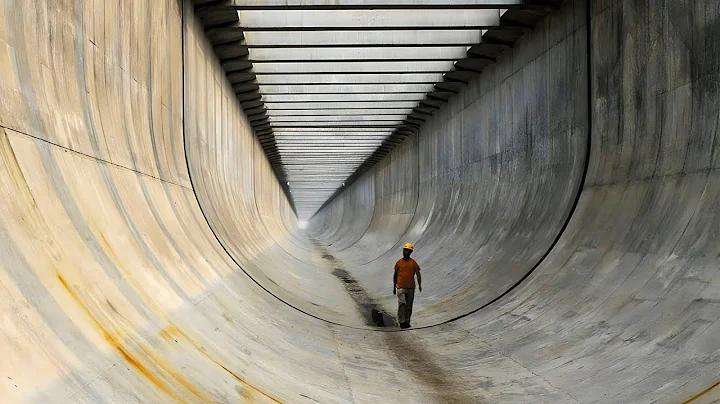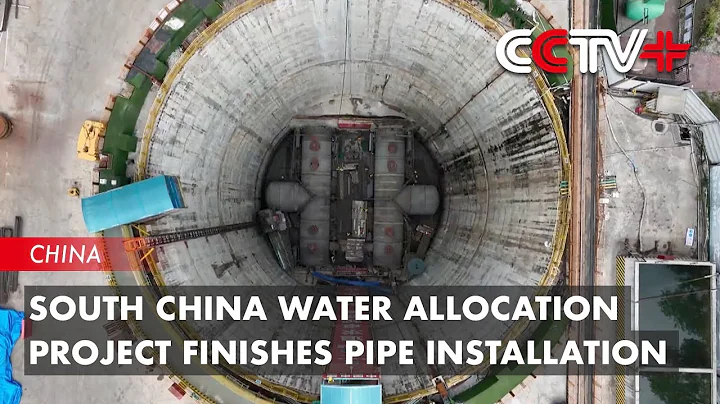On January 30th, as the water intake gate of the Xijiang Pumping Station located in Shunde, Foshan, was slowly lifted, the Liyuzhou, Gaoxinsha, and Luotian pumping stations, as important parts of the Pearl River Delta Water Resources Allocation Project, started operating. The water from the Xijiang River, flowing through underground water tunnels, entered reservoirs along the way, marking the start of the first operating period of the project.
It is reported that the total length of the water transmission line in the project is 113.2 kilometers, with an annual water supply capacity of 1.708 billion cubic meters, costing a total investment of around 35.4 billion yuan. It starts from the mainstream of the Xijiang River at Liyuzhou in Foshan's Shunde district and extends eastward to the Gongming Reservoir in Shenzhen. Consisting of one main line, two branch lines, three pumping stations, and four regulating reservoirs, it traverses the core urban agglomeration of the GBA through underground water tunnels.
The water supply will benefit more than 32 million people, meeting the water demand for production and daily use in Guangzhou, Shenzhen, and Dongguan, while providing emergency backup water sources for Hong Kong and other cities. It will gradually restore the ecological water in the Dongjiang drainage basin, further ensuring the water supply and ecological security of the GBA.

Address the uneven disution of water resourcetribs
As one of the provinces with the most abundant precipitation in China, Guangdong, however, faces the challenge of uneven distribution of water resources. The per capita water resources in Guangdong are far below the national average, while 80% of the rainfall is concentrated in the flood seAson, leading to drought and water shortage in certain areas.
Correspondingly, the rapid economic and social development in the region has increased the demand and pressure on water resources. Specifically, in the Greater Bay Area, 68% of the permanent population and 74% of the total economy rely on the water resources of the eastern Pearl River Delta, which take up only 43% of the province's total.
The water resources derived from the Dongjiang River are insufficient to sustain the future development of the Pearl River Delta. But how to address the roots of water shortage in the Dongjiang drainage basin? Since the quantity of water resources in the Xijiang River is around 10 times that of the Dongjiang River, with an exploitation and utilization rate of merely 1.3%, the best solution is to divert water from the Xijiang River to relieve the "thirst" of the Dongjiang River.
From the proposal of the initial concept of "diverting water from the west to the east" in 2005, to the start of comprehensive construction in 2019, the entire preparatory work lasted for 14 years. After extensive efforts including on-site surveys, economic analysis, stability assessment and expert reviews, a "giant dragon" stretching over 113 kilometers across the heartland of the GBA was finally decided upon as the ultimate water transmission route.
How is the water diversion achieved
It poses great challenges to engineering as the Pearl River Delta region is densely covered with rivers and road networks with numerous underground faults and complex geographical conditions. However, utilizing the method of deep shield tunneling, the project has managed to traverse 4 high-speed rail sections, 8 subway sections, 12 highway sections, and 16 sections of rivers, lakes, and seas, while reserving shallow underground spaces for multiple municipal projects. Nevertheless, numerous world-class challenges still occurred to bother the deep-buried "giant dragon".
"In the underground space with an average depth of 40 to 60 meters, the maximum water pressure in the transmission tunnel would be 1.3 MPa, equaling the weight of 2600 people standing on one square meter at the same time. The need to withstand this pressure poses great challenges to the design," said Du Canyang, the manager of a water supply company. To tackle this problem, the project adopted the technique of cast-in-place non-bonded prestressed concrete.
In the 28-kilometer section from the Gaoxinsha Reservoir to the Shaxi elevated water tank, a 6.4-meter diameter reinforced concrete pipe was cast in place. If it is still not enough to withstand the water pressure, the concrete would be tied up with steel wires every 50 centimeters to add prestress. "The large-scale use of cast-in-place non-bonded prestressed technology is rarely seen worldwide. We have created the world's longest prestressed lining water transmission tunnel," said Du Canyang.
"During the construction process, the constructors have overcome multiple challenges, breaking three world records as they created the shield tunnel with the highest water transmission pressure in the world, the longest prestressed lining water transmission tunnel in the world, and the longest pressurized water diversion project in the world," said Zhu Zhaorong.

Improving people's livelihoods and prospering the cities
"According to recent tests, the water quality of the Xijiang River has remained in the II standards for almost the entire year, equivalent to the quality of drinking water," Du Canyang told the reporter. Currently, the Huangge Water Plant in Nansha District is under testing, allowing residents of Nansha to drink fresh water from the Xijiang River. The water intake in Panyu District is under construction, and its residents will also be able to drink water from the Xijiang River in two to three years. The Songshanhu Water Plant in Dongguan, which treats 1.1 million tons of water per day, is also testing the water supplied from the Xijiang River.
The race between economic development and water demand has come to an end. "What does it mean to have an annual water supply capacity of 1.7 billion cubic meters? Think about it, the annual water consumption of Shenzhen is around 2.1 billion cubic meters, and our water supply capacity is capable of supplying such a large city," said Du Canyang.
"The arrival of the water from the Xijiang River has also accelerated the ecological water return to the Dongjiang River. Dongguan and Shenzhen have already formulated plans for ecological water return," Du Canyang added. In his view, the Xijiang River has a vast potential for exploitation with its annual average runoff of around 230 billion cubic meters, about one-fifth of the Yangtze River and five times that of the Yellow River. It not only serves as the "economic water" that drives development, but also the "ecological water" promoting the construction of a green and beautiful eco-friendly Guangdong.
Source: Yangcheng Evening News
「灣區巨龍」潤嶺南,創多項世界之「最」
1月30日上午11時許,位於佛山順德鯉魚洲島上的西江取水閘口緩緩升起,珠江三角洲水資源配置工程鯉魚洲、高新沙、羅田三大泵站同步啟動運轉,汩汩西江水經由深埋地下的輸水隧洞,流入高新沙、羅田、公明等沿線水庫,標誌著該工程實現全線正式通水,進入初期運行階段。
記者在現場獲悉,該工程輸水線路全長113.2公里,總投資約354億元,年供水量17.08億立方米,西起西江幹流佛山順德鯉魚洲,東至深圳公明水庫,由一條幹線、兩條分幹線、一條支線、三座泵站和四座調蓄水庫組成,以地下深層輸水隧洞形式穿越粵港澳大灣區核心城市群。
此次通水將惠及超過3200萬人口,系統解決廣州、深圳、東莞生產生活用水問題,為香港等地提供應急備用水源,可逐步退還東江流域生態用水,進一步保障粵港澳大灣區供水安全、生態安全。

為何引?水資源時空分布不均勻
廣東是全國降水量最為充沛的省份之一,但也面臨著水資源時空分布不均問題,人均水資源量遠低於全國平均水平,且80%的降雨集中在汛期,局部區域乾旱缺水問題仍未得到有效解決。
與之對應的是,當地經濟社會的快速發展,更加劇了對水資源的需求和壓力。具體到粵港澳大灣區,珠三角東部以43%水資源支撐68%的常住人口和74%的經濟總量。
要支撐珠三角未來發展,僅靠東江水已難以為繼。如何從根本上解決東江流域缺水問題?在西江流域,其水資源量大約是東江的10倍,水資源開發利用率只有1.3%左右,謀劃引西江之水解東江之「渴」,成為解決粵港澳大灣區東部城市群缺水難題的最佳途徑。
從2005年提出「西水東調」的初步構想,到2010年啟動「西水東調」工程前期工作,再到2019年工程全面開工建設,整個準備調研工作長達14年。經過漫長而深入的實地勘察、經濟分析、維穩評估、專家評審等多方面努力後,一條全長113餘公里、穿越灣區腹地的「灣區巨龍」躍然紙上,成為最終敲定的輸水線路方案。

如何引?攻克多項世界級難題
珠三角地區地上河網密布、路網交錯,地下斷層紛繁、地質多變,對工程建設考驗極大、要求極高。記者了解到,工程以深埋盾構方式,穿越高鐵4處、穿越地鐵8處、穿越高速公路12處、穿越江河湖海16處,並為地鐵、通信、電力、管廊等市政建設預留淺層地下空間。然而,深埋盾構的「灣區巨龍」,卻給工程設計、建設、運營帶來諸多世界級難題。
「在平均縱深40米到60米的地下空間,輸水隧洞設計最大內水壓力1.3MPa,相當於2600個人同時站在一平方米的地方,由於要考慮對抗這個力量,設計就很難。」 廣東粵海珠三角供水有限公司總經理杜燦陽說,工程後來通過採用現澆無粘結預應力混凝土技術來解決這個問題。
記者了解到,從高新沙水庫到沙溪高位水池的28公里工程段,現澆6.4米內徑的鋼筋混凝土管道,如果鋼筋混凝土仍然不足以抵禦這麼強的水壓,就要再增加一個預應力,每50厘米用鋼絲繩把混凝土捆起來、加大應力。「本身現澆無粘結預應力技術的大規模使用在全世界範圍內都是少見的,我們創造了全世界最長的預應力襯砌輸水隧洞。」杜燦陽說。
「建設過程中,建設者攻克了長距離深埋盾構施工、高水壓預應力襯砌設計施工、大流量寬揚程變速水泵研發、從獅子洋岸邊水平定向勘探取芯等難題,創造了三個世界之最——世界上輸水壓力最高的盾構隧洞、世界上最長的預應力襯砌輸水隧洞、世界上流量最大的長距離有壓調水工程。」朱朝榮說。

有何效?以水興城惠民生
「我們最近進行了檢驗,整個西江水質基本全年能達到Ⅱ類標準,是飲用水級別的。」杜燦陽告訴記者,目前,位於南沙區的黃閣水廠已在調試,南沙區的居民可以喝上新鮮的西江水;番禺區分水口正在建設當中,兩三年後就能讓當地居民也喝上西江水;在東莞建設的每日處理110萬噸水的松山湖水廠,輸送來的西江水也在調試中。
經濟發展與供水需求的賽跑也告一段落。「年供水量17億立方米意味著什麼?整個深圳一年的用水量大約是21億立方米,我們的供水量就接近供給這樣一座特大型城市。」杜燦陽表示。
「實際上,西江水的到來,也加速了對東江的生態退水,東莞、深圳都已經制定了這個生態退水的方案。」在杜燦陽看來,西江年平均徑流總量約2300億立方米,約為長江的五分之一、黃河的五倍,有非常廣闊的挖掘潛能,不僅是帶來發展新動能的「經濟水」,更是推動綠美廣東生態建設的「生態水」。
文丨記者 許張超 胡彥 通訊員 粵水軒
圖丨通訊員提供
翻譯丨洪婷





















